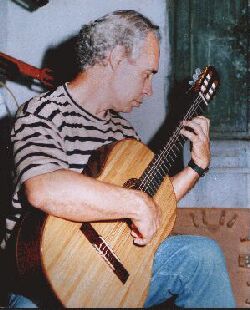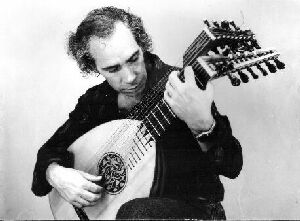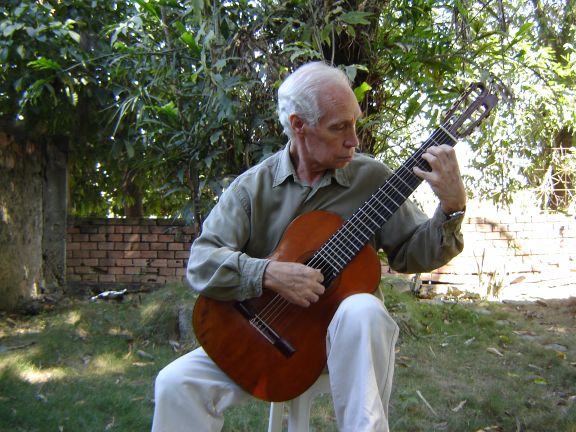Norberto Macedo was born in Barcos, Tabuaço, province
of Alto Douro,
Portugal,
in 1939, and came to Brazil in 1952. He is a recitalist on the guitar
and lute, composer, and professor of classical guitar. Among his
compositions, about a hundred, are choros,
sambas, etudes, preludes, arrangements, and four suites: "Suite para
Portinari", "Suite Dom Quixote" (twenty-one pieces based on the
drawings of the Brazilian painter Cândido Portinari), "Suite para
Rosana", and "Suite Seresteira" (part of a method with Mário
Mascarenhas). His recordings comprise two LPs for RCA Victor: "Meu
violão… minha seresta…" and "Villa Lobos, recital de
violão", one for Discos Copacabana "Violão em recital de
gala", a cassette tape "Romance de Amor" (independent production), and
two CDs "Portinari 90 Anos - Coração Brasileiro" for
Kuarup Discos, and "Alto Macabu" produced by his own label
"Serestrelo". He has had his own radio programs on Rádio MEC
(run by the Ministry of Education), Rádio Mundial, and
Rádio Rio de Janeiro, and participated in various others by
invitation. He is the co-author, with
Mário Mascarenhas, of a classical guitar method
"Iniciação ao Violão por Música" published
by Irmãos Vitale S/A, São Paulo. During many years,
recordings of Norberto were used as prefixes of Rádio MEC, and
as character themes of Brazilian television series. Two compositions
were used for the background of the video "Menino de Brodosqui" , part
of the weekly documentary series "Globo Reporter" of TV Globo, and
various others used in the video "Um Cândido Pintor Portinari" of
TVE (the education channel). Norberto has appeared in various newpaper
articles in Brazil and Porgugal, as well as in national and
international magazines. He has given recitals in many location of
greater Rio de Janeiro and in other municipalities of the state,
as well as
in other states of Brazil and in Portugal. Highlights of the last few
years are:
- Two visits to his native Portugal where he gave recitals in
Tabuaçu, Barcos, Estoril, Lisbon, and Évora.
- A recital at the Cultural Center of Banco do Barsil (one of
the
federal banks) in São Paulo at the event: Casamento na Roça, Portinari,
imagem poesia e música1.
- A recital at the Magistrature Shool of Rio de Janeiro (EMERJ) at
the book signing event for Dom
Quixote - 400 anos de Paixão2 where he played
various pieces from the suite Dom
Quixote-Portinari.
- Sound track for the CD-ROM Espirito
das Aguas3, production of the Portuguese painter DAD
and poet André Moa.
- Background music for the opening page of the CD-ROM accompanying
the Catalogue
Raissoné of the works of the Brazilian painter
Cândiso Portinar produced by the Projeto Portinari.
- Participation in the Rádio Nacional broadcast on the
programs Rádio Memória4
and Onde Canta o Sabiá5
hosted by Gerdal dos Santos.
- Recital at the 7th Mill of Knowledge of the Shool
of Industrial Marketing (EIM) with introduction by Jõao
Cândido Portinari of the Projeto Portinari.
1 Country Wedding, Portinari, images, poetry and music.
2 Don Quixote - 400 years of passion.
3. Spirit of Waters.
4. Memory Radio.
5. Where the Sabiá Sings. (A expression from a Brazilian popular
song. The sabiá is a very melodic songbird.)
Home Page
Discography (CD)



